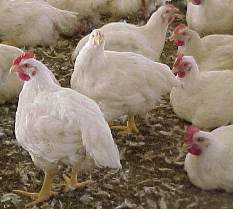Broiler survey shows potential for better disease control

The importance of good protection against infectious bronchitis (IB) and infectious bursal disease (IBD) — often hidden diseases that impair bird performance — has shown up in a new survey of broiler farms in the South West of the UK.
The serology survey, commissioned by Datapoul as part of the South West Health Initiative and supported by a Pfizer Poultry Health educational grant, covered 169 farms representing more than 90% of the broiler farms in the region.
The survey found that 20% of farms tested positive for IB 793B infection — higher than expected and not associated with any clear clinical signs on the farms in question
The newer IB QX variant strain of the disease, which has spread to the UK over the past four years, was found on 7% of farms. These farms were in areas where QX virus had already been diagnosed on layer units.
Poultry vaccination
The positive farms were given advice on adopting a more robust vaccination programme using the vaccine on day 1 and day 10, and on biosecurity measures.
The survey report stated: “The most important thing that farmers can do to protect their flocks against IB is to have good biosecurity and hygiene measures in place.”
Gumboro disease
Regarding IBD also known as Gumboro disease, 24% of farms had positive titres suggesting infection on top of vaccine and pointing to a large number of farms where the disease is sub clinical with raised blood titres.
An audit of the administration and type of vaccine was carried out by the farmers’ vets and, says the report, all farms on intermediate vaccine with evidence of sub clinical infection were moved to a hotter strain of vaccine.
The survey covered 81 farms with standard or lower stocking density indoor production and 88 free range or organic farms. A higher percentage of free range and organic farms tested positive for each type of infection.
Related website
Pfizer
Datapoul













